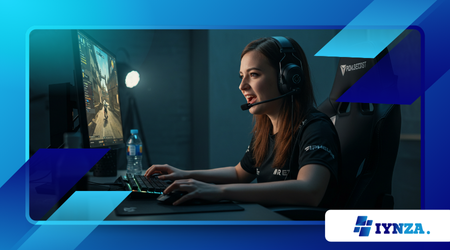The Psychology of Competitive Gaming and How to Manage Stress

What drives someone to play for hours, through loss streaks and mental fatigue, for a single win that might last only seconds? The psychology of competitive gaming runs deep.
Anúncios
It’s a mix of adrenaline, motivation, identity, and emotional regulation. And when it’s not well managed, it can lead to exhaustion, burnout, and even anxiety.
Understanding the psychological layers behind competitive gaming isn’t just useful for pros. Anyone who’s ever thrown a match out of frustration or felt the weight of ranked pressure can benefit.
Stress in competitive environments doesn’t have to break you—it can shape you, if you know how to respond.
Why Competitive Gaming Feels So Intense
There’s something uniquely intense about competitive games. They demand your attention, your strategy, your reflexes—and they give instant feedback on your performance.
That feedback loop, powered by wins and losses, triggers the brain’s reward system much like gambling or sports.
But it’s more personal. You’re not just playing the game—you are the game. Your decisions, your performance, your rank. That’s what creates emotional highs and lows, leading to stress and identity entanglement.
The constant pursuit of improvement, the fear of losing rank, and the social comparisons all fuel internal pressure. When that pressure becomes chronic, the game stops being fun. Recognizing this psychological intensity is the first step to building healthier gaming habits.
Read also: How to Stay Mentally Strong in Competitive Gaming
The Role of Identity and Ego in High-Stakes Matches
When someone loses a game, they don’t just lose virtual points—they may feel like they’ve lost a part of themselves. That’s because competitive gaming is often tied to identity. Gamers work hard to improve, build ranks, and earn recognition, and setbacks can feel deeply personal.
This connection between ego and performance leads to emotional reactions. Rage quitting, blaming teammates, or spiraling after losses isn’t just bad sportsmanship—it’s a symptom of psychological strain. Your brain treats these moments as threats to your self-image.
Managing ego doesn’t mean ignoring your ambition. It means separating your self-worth from your current performance.
You’re more than your rank. Learning to detach emotionally while still staying invested is a core mental skill in competitive environments.
How Loss Impacts Motivation and Focus
Losses carry more psychological weight than wins. This is known as loss aversion—a principle in behavioral psychology.
In games, it means that losing 25 LP feels worse than gaining 25 LP feels good. This imbalance creates frustration, especially in long gaming sessions.
As a result, players may chase wins with less clarity, taking more risks or playing on tilt. Focus narrows, emotions rise, and decision-making suffers. It becomes harder to stay strategic when your motivation is tied to reversing a loss streak.
To manage this, players must redefine motivation. Instead of chasing numbers, focus on improving micro-skills—like communication, map awareness, or mechanical consistency. Shifting attention from outcome to process helps sustain motivation even in losing streaks.
Stress and Burnout: The Hidden Cost of Climbing Ranks
Stress isn’t always negative. A little tension sharpens focus and boosts performance. But when stress becomes chronic, it affects sleep, energy, and mood. Gamers experiencing burnout often feel tired before matches, irritable during games, and detached after playing.
Burnout isn’t just physical—it’s mental. It builds up from unrealistic expectations, poor recovery, and lack of emotional regulation. Many players don’t rest between sessions. They push through, hoping the next win will fix the frustration. That cycle only deepens exhaustion.
Taking breaks, logging out during tilt, and switching to casual modes are not signs of weakness. They’re strategies for longevity. Stress management in gaming means knowing when to push—and when to pause.
Building Mental Resilience Through Gameplay
Competitive games test more than reflexes—they test grit. The ability to bounce back after defeat, to stay composed during bad streaks, and to learn from failure is what separates growth from stagnation.
Mental resilience can be trained. Start by tracking patterns: when do you tilt, what triggers frustration, how do you recover? Self-awareness is key. Then, develop habits like post-match reflection, breathing techniques, or in-game affirmations.
Over time, resilience shows up as consistency. Not every match will go your way—but your reaction to setbacks becomes calmer, more focused. That mindset shift improves performance and preserves your enjoyment of the game.
Creating a Balanced Gaming Routine
Balance doesn’t mean gaming less—it means gaming smarter. Structure your sessions with purpose. Play for improvement, not just escape. Set session goals, take regular breaks, and mix high-stakes matches with low-pressure play.
Sleep, hydration, exercise, and social interaction also matter. The brain needs recovery. A balanced lifestyle supports sharper focus, quicker reflexes, and better emotional regulation in matches.
Remember: competitive gaming is a marathon, not a sprint. Burnout and stress are signs that your routine needs adjustment. Sustainable progress comes from respecting your limits as much as pushing them.
FAQ: Managing the Psychology of Competitive Gaming
1. Why do I feel angry or upset after losing in ranked?
Because competitive games trigger your brain’s reward system. When you lose, it can feel like a threat to your identity or effort.
2. Can stress from gaming affect other areas of life?
Yes. Chronic stress from gaming can influence sleep, mood, and even relationships if not managed properly.
3. What are signs of gaming burnout?
Lack of motivation, irritability, physical fatigue, and detachment from gameplay are common signs.
4. How can I stay focused without tilting?
Practice mindfulness, take short breaks, and focus on process-oriented goals rather than just wins.
5. Is it okay to take breaks from ranked modes?
Absolutely. Playing casual or non-competitive games helps reset your mindset and reduce pressure.
